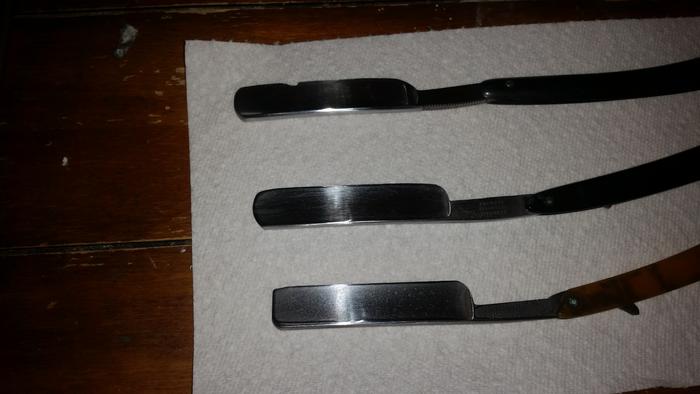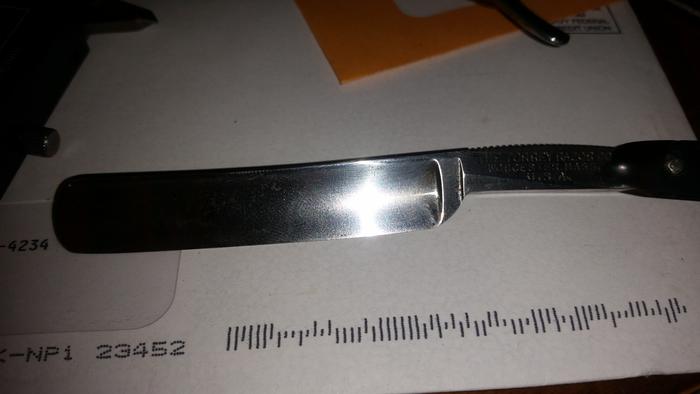Results 1 to 10 of 12
-
02-02-2016, 12:01 AM #1Senior Member



- Join Date
- Dec 2014
- Location
- Virginia, USA
- Posts
- 2,224
Thanked: 481 question about honing a razor that required a good bit of grinding
question about honing a razor that required a good bit of grinding
I have a razor made by The Torrey Razor Co. I'll post pics of what it looked like when I got it, and what it looks like now. But long story short, there was a pretty good crack in the blade, and I had to nibble out a solid chunk of the blade to get rid of it. I would say it lost nearly 2/8 of blade. It's width from spine to edge is pretty even the entire length of the blade. My question is, do I need to nibble any steel from the width of the spine to compensate for the lost width of the blade, or should it be fine to set the bevel as is and roll on?
-
02-02-2016, 12:03 AM #2Senior Member



- Join Date
- Dec 2014
- Location
- Virginia, USA
- Posts
- 2,224
Thanked: 481
Before and afters (Torrey is at the top in the first pic):

After:

-
02-02-2016, 12:37 AM #3Senior Member




- Join Date
- Feb 2013
- Location
- Haida Gwaii, British Columbia, Canada
- Posts
- 14,456
Thanked: 4830
That is a very large percentage of the blade to loose. I have no idea how it will shave. That much taken away should effect the angle of the bevel, however I have no idea how it will effect the shave, which is the important part come the end of the day.
It's not what you know, it's who you take fishing!
-
02-02-2016, 12:46 AM #4Senior Member



- Join Date
- Dec 2014
- Location
- Virginia, USA
- Posts
- 2,224
Thanked: 481
Right, and that's why I asked before even thinking of setting the bevel. IF the spine needs to be thinned up, I would rather do it now than go through all the trouble of setting the bevel and honing it up to a N 8K just to find out then the spine will need thinning and the bevel reset...maybe I need to quit being lazy and crunch some numbers.
-
02-02-2016, 12:55 AM #5Senior Member




- Join Date
- Feb 2013
- Location
- Haida Gwaii, British Columbia, Canada
- Posts
- 14,456
Thanked: 4830
well it does not really matter what happens with the math, hone that baby up and take her for a spin. It will either pass or fail and that will answer your question without doubt.
It's not what you know, it's who you take fishing!
-
The Following User Says Thank You to RezDog For This Useful Post:
Marshal (02-02-2016)
-
02-02-2016, 01:02 AM #6

You can easily see what your bevel angles will be by using the spreadsheet located about halfway down this page:
http://coticule.be/wedges.html
Alternatively, post the spine width and distance from edge to farthest point of the spine here and I will run the numbers for you - only takes a second.
-
-
02-02-2016, 02:10 AM #7Senior Member



- Join Date
- Dec 2014
- Location
- Virginia, USA
- Posts
- 2,224
Thanked: 481
Well, that will be a problem for tomorrow. Left my calipers at work. I'll just stick to working on the Wedge for tonight, and check measurements tomorrow when I get a chance.
-
02-02-2016, 03:29 AM #8

Pardon me for inserting a comment here as I am a beginner at razor honing -- who came here to ask a question of my own, but... While, I'm a beginner at honing razors, I've honed a lot of knives and the only thing that is really different, AFAIK, is blade geometry. It appears that most razors (wedges may be an exception since they are essentially the same as a Scandi grind knife cut off at the top of the bevel) are honed with a bevel angle of between 15 and 20 degrees. Going much below that and the edge is too weak, above that and it's not sharp enough. Most razors appear to shoot for something around the middle of that target. The triangle that forms the bevel, on a straight razor, goes from the stone at the base of the spine to the top of the spine, then down to the stone at the blade edge at the stone, then from the blade edge back to the base of the spine at the stone. It is my understanding that for this triangle to fall midway between that 15-20 degrees sweet spot, the ratio of width of the blade to the height of the spine needs to be about 4:1. Something in the 3.8:1 to 4.2:1 range will keep you in the 15-20 degree range. That is assuming that my source of information, a custom razor maker, is correct.
Last edited by Uzi; 02-02-2016 at 03:33 AM.
-
02-02-2016, 04:07 AM #9Senior Member



- Join Date
- Apr 2012
- Location
- Diamond Bar, CA
- Posts
- 6,553
Thanked: 3215
As said, hone that puppy… New honers do that and more, all the time.
Should shave just fine, though you may want to put the slight smile back on.
-
02-02-2016, 07:48 AM #10Senior Member



- Join Date
- Dec 2014
- Location
- Virginia, USA
- Posts
- 2,224
Thanked: 481
Uzi - same basic theory, slightly different target bevel angle (well, for some. I like a sharper bevel on my knives - closer to 20 degrees than 30). World of difference in skill required to obtain a shaving edge though. I saw a thread with a lot of spine width and blade length measures, didnt think to compare the ratios. But yes, the target is between 15 and 20, but I think some old Wade & Butchers had a nearly 25 degree bevel.
I'm seeing a lot of mentors saying to just hone that puppy...looks like that will be tomorrow's project. I'm probably just over thinking it - as usual.
Euclid - I think I actually did a little more tuning after that picture was taken. When I was done it had no more than .002 variance in width all the way down the blade. I did a final sweep of the blade to reform the smile, rounded up the toe a bit, and reprofiled the heel slightly to keep the stabilizer off the hones.


 8Likes
8Likes LinkBack URL
LinkBack URL About LinkBacks
About LinkBacks






 Reply With Quote
Reply With Quote